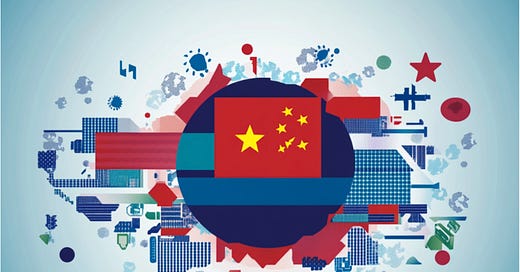Event - Deterrence, Diplomacy, and Risk of Conflict: the Taiwan Challenge for the EU
WEBINAR - We will explore this critical geopolitical challenge with Bill Emmott, who recently published a book on deterrence and the risk of conflict over Taiwan and Mariangela Pira (Skytg24)
Deterrence failed in Europe in 2022, so it had better be employed more effectively in the Indo-Pacific
Bill Emmott
WEBINAR - 18/02/2025, 14:30 - 18/02/2025, 15:30
Click here to register and receive the connection link
Russia’s full-scale invasion of Ukraine has underscored the return of great-power competition, elevating the risk of global conflict and bringing the concept of deterrence back to the forefront.
While a war between China and the United States is not inevitable, nor is a potential Chinese invasion of Taiwan that could trigger it, the stakes are extraordinarily high. A direct conflict between the world’s two most powerful militaries would bring the world closer to nuclear catastrophe than at any time since the Cuban Missile Crisis of 1962.
What role can the EU play in a global deterrence strategy to prevent such a conflict? How might the EU effectively de-risk its relationship with the Taiwanese semiconductor industry?
We will explore this critical geopolitical challenge with Bill Emmott, who recently published a book on deterrence and the risk of conflict over Taiwan. He will be joined by Mariangela Pira, journalist and anchor at SkyTg24. Both are IEP@BU media fellows. Stefano Feltri will moderate the conversation.
Speakers
Bill Emmott is Chairman of the IISS Trustees and an independent writer and consultant. He spent 26 years at The Economist, which he joined in 1980. His recent Adelphi book, Deterrence, Diplomacy, and the Risk of Conflict over Taiwan, provides a timely analysis of these pressing issues.
Mariangela Pira is a journalist and anchor at the Italian TV network SkyTg24, and she is also an IEP@BU media fellow.
Stefano Feltri, IEP@BU communication advisor, will moderate the discussion.
Executive summary
A war between China and the United States is not inevitable, nor is the potential Chinese invasion of Taiwan that could trigger it. But nothing can be more important than that the deterrence strategies, mixed with diplomacy, being deployed by all sides are made strong and clear enough to prevent that war.
For one thing is certain: a direct conflict between the world’s two most powerful militaries would bring the world closer to nuclear conflagration than at any time since the Cuban Missile Crisis of 1962.
The stakes in such a conflict would be so high as to make escalation to nuclear war likelier than not.
The task is clear: to use deterrence to prevent a conflict over Taiwan from ever becoming a serious prospect.
Having been a central element of strategy during the Cold War, deterrence faded from prominence during the first decade of the twenty-first century when non-state actors and rogue states rather than nuclear superpowers became the West’s principal adversaries, and a desire to replace deterrence with pre-emption took hold, primarily in the US.
The revival of great-power competition has brought the prospect of global conflict, and with it a focus on deterrence, back to centre stage.
When Russia invaded Ukraine, it had not been deterred by fear of sanctions or isolation, nor by being told that by invading Ukraine it would be breaking international law and the UN Charter, nor by evidence of the reach and quality of US intelligence-gathering.
Deterrence failed in Europe in 2022, so it had better be employed more effectively in the Indo-Pacific, for two simple and stark reasons.
The first is that, as the Russo-Chinese strategic partnership – established weeks before the invasion of Ukraine – makes clear, there are no neat regional boundaries or delineations where great-power competition is involved.
The second is that the stakes in a conflict in East Asia, especially one over Taiwan, are even higher than those in Ukraine. Creating and applying a strategy of deterrence in the Indo-Pacific to avoid this potentially catastrophic war is a complex task.
All sides are attempting this: China through an impressive military build-up and by exercises in the area around Taiwan; Taiwan by raising its defence budget sharply and seeking new military capabilities; the US by repositioning its own forces and assembling an array of allies and partners – notably Japan, the Philippines, and Australia – to try to convince China that the risks and costs of an invasion or blockade are too high to make the attempt worthwhile. Some yardsticks can be used to measure the chances of such deterrence strategies succeeding:
Political will: consistency and clarity of deterrence messages. A deterrence strategy is not just about possessing the military capabilities to prevent your adversary from achieving their goal; it also requires evidence of the political will to use those capabilities. • Military capability: speed and scale of response. Military capabilities need to be positioned in such a way as to be able to intervene with sufficient speed and force to alter the calculations of the adversary.
Coalition credibility: assurance of allies and partners. If the active participation of countries such as Australia, Japan and the Philippines in Indo-Pacific deterrence is to remain important for Western strategy, those countries need to be assured through consistent messages about the strategy and political will of their lead partner, the US.
Messaging: clarity of narrative. For all parties to a potential conflict, the need to maintain public support in their own countries and to gain support from other countries, especially those in the Indo-Pacific region itself, makes the task of defining and regularly reinforcing a clear narrative essential.
Bill Emmott uses these yardsticks to evaluate the strategies that countries in and outside the Indo-Pacific region are using to try to reduce the risk of this inevitably catastrophic conflict occurring. He examines strategies in light of the Ukraine war and assesses their potential effectiveness and sustainability.
The lessons of Ukraine for Taiwan and the Indo-Pacific are that political decisions will play the key role; that forward deployment of outside forces will be critical for deterrence; that sanctions are irrelevant to the deterrence of major aggression; that establishment of escalation dominance will be crucial; that the speed of decision-making and delivery of outside intervention is an unpredictable variable; that the determination of the Taiwanese themselves will affect that delivery; that the battle of narratives will play a central part; that nuclear escalation cannot be ruled out; and, last but not least, that a successful invasion of a neighbouring country is hard and risky, even for a superpower.
Emmott does not believe that descriptions of today’s great-power rivalry as ‘a new Cold War’ are either accurate or meaningful.
But in today’s conditions there is a need to learn from and ideally reproduce two of the best and most important features of how the original Cold War confrontation came to be managed.
One was the value of political and strategic consistency over time, even as political parties and leaders change; the other was the value of a diplomatic process of dialogue and negotiations that focuses on the most critical issues, which are Taiwan, arms control and nuclear weapons.
It is only through such a process that anything like a mutual understanding of what is at stake is likely to arise. Our goal, Emmott argues, must be for a US–China conflict to be considered by all sides as being ‘inevitably catastrophic and therefore inconceivable’.
When Will Germany Be Back?
February 24, 2:30 PM-3:30 PM - ONLINE
The day after the federal snap election, we will explore the European consequences of the vote against the backdrop of Germany’s economic challenges.
In November 2024, a coalition government collapsed when Chancellor Olaf Scholz dismissed Finance Minister Christian Lindner, highlighting Germany’s ongoing struggle to balance its political ambitions, renewed security priorities, and stringent budget rules.
For the first time in decades, the European Union faces a dual leadership vacuum in Germany and France—two pivotal member states in EU politics.
Meanwhile, geopolitical and economic challenges continue to escalate: the war in Ukraine demands unwavering commitment from the EU's leading states and institutions, and Donald Trump’s return to power introduces uncertainty to global economic and multilateral governance.
Join us as we debrief the European implications of the German federal elections with Wolfgang Munchau and Diana Pieper.
Speakers:
Wolfgang Munchau is one of the foremost commentators on EU economic and political affairs. He is the director of Eurointelligence and the author of the recent book Kaput: The End of the German Miracle.
Diana Pieper is a Berlin-based journalist with Die Welt and an IEP@BU Media Fellow.
Stefano Feltri, IEP@BU communication advisor, will moderate the conversation.
Please, REGISTER HERE
The IEP@BU Mission
Founded by Bocconi University and Institute Javotte Bocconi, the Institute for European Policymaking @ Bocconi University combines the analytic rigor of a research institute, the policy impact of a think tank, and the facts-based effort of raising public opinion’s awareness about Europe through outreach activities. The Institute, fully interdisciplinary, intends to address the multi-fold obstacles that usually stand between the design of appropriate policies and their adoption, with particular attention to consensus building and effective enforcement.
The Institute’s mission is to conduct, debate and disseminate high-quality research on the major policy issues facing Europe, and the EU in particular, its Member States and its citizens, in a rapidly changing world.
It is independent from any business or political influence.
The IEP@BU Management Council
Catherine De Vries, Dean for International Affairs and Professor of Political Science at Bocconi University
Daniel Gros, IEP@BU Director
Sylvie Goulard, IEP@BU vice-President, Professor of Practice in Global affairs at SDA Bocconi School of Management
Silvia Colombo, IEP@BU Deputy Director
Carlo Altomonte, Associate Professor at Bocconi University and Associate Dean for Stakeholder Engagement Programs at SDA Bocconi School of Management
Valentina Bosetti, professor of Environmental and Climate Change Economics at Bocconi University
Elena Carletti, Dean for Research and Professor of Finance at Bocconi University
Eleanor Spaventa, Professor of European Union Law at Bocconi Law School










Fully agree. Posted right now about geopolitical risks. https://open.substack.com/pub/marketszoon/p/managing-geopolitical-risk-requires?r=58uzcq&utm_medium=ios